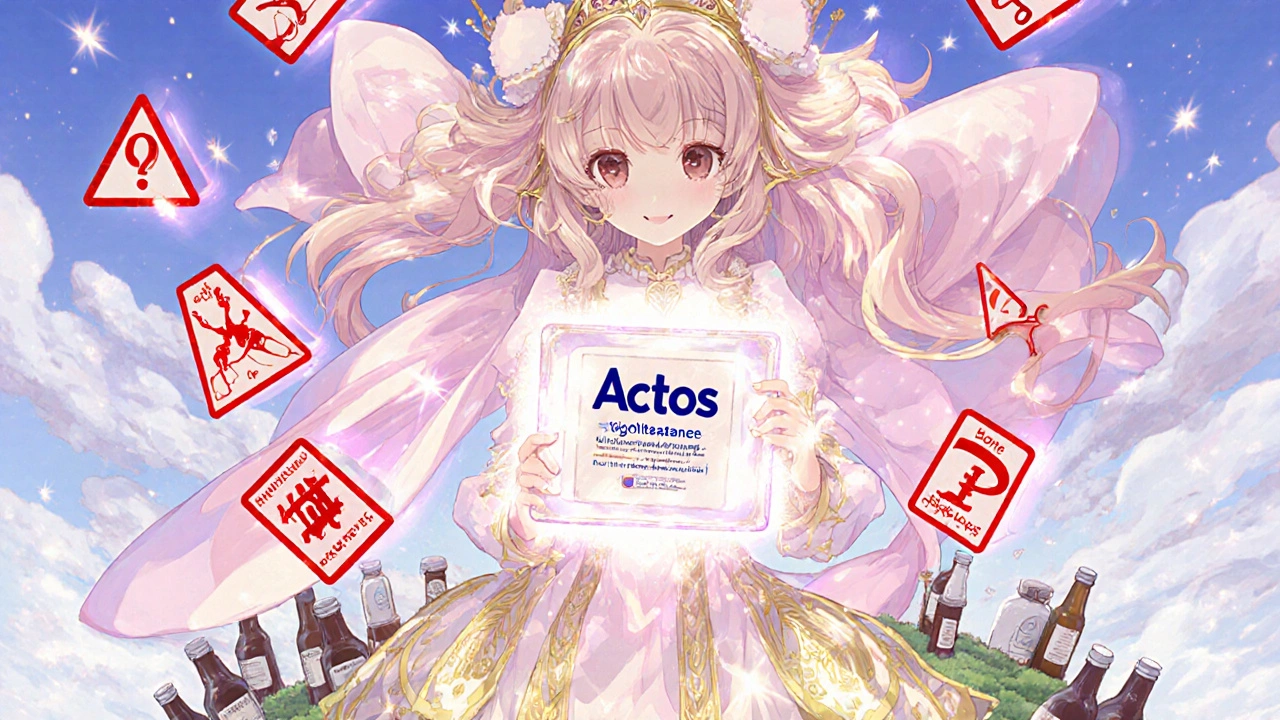Diabetes Medication Comparison Tool
Personalized Diabetes Medication Comparison
Answer these questions to see which diabetes medications may be best for you. This tool compares Actos (pioglitazone) with top alternatives based on your specific health profile.
Recommended Options
Important: This tool provides general guidance based on the article content. Always consult your healthcare provider before making any medication changes.
If you’re taking Actos (pioglitazone) for type 2 diabetes and wondering if there’s a better option, you’re not alone. Many people on this medication notice side effects like weight gain, swelling, or fatigue-and start asking if other drugs might work just as well without the downsides. The truth is, Actos isn’t the only tool in the box. In fact, newer medications have changed how doctors treat type 2 diabetes, and some alternatives may offer better results with fewer risks.
What Actos Actually Does
Actos, the brand name for pioglitazone, is an insulin sensitizer. It doesn’t make your body produce more insulin. Instead, it helps your muscles, fat, and liver respond better to the insulin you already have. This lowers blood sugar by making your cells more efficient at absorbing glucose.
It’s been on the market since the late 1990s. Back then, it was a big deal because it worked differently from metformin or sulfonylureas. But over time, concerns piled up. Studies linked pioglitazone to a higher risk of bladder cancer (though the absolute risk is low), heart failure, bone fractures in women, and significant weight gain-sometimes 5 to 10 pounds in just a few months.
Still, it’s not useless. For some people-especially those with insulin resistance and no history of heart or bladder issues-it keeps blood sugar stable without causing hypoglycemia. But if you’re looking for something safer, more effective, or easier to tolerate, there are now better choices.
Metformin: The First-Line Standard
Most doctors still start with metformin. It’s cheap, well-studied, and has been around for over 60 years. Unlike Actos, metformin doesn’t cause weight gain. In fact, many people lose a few pounds on it. It also lowers the risk of heart disease and doesn’t increase the chance of low blood sugar when used alone.
Side effects? Mostly stomach upset-diarrhea, nausea, gas. These usually fade after a few weeks. Extended-release versions help reduce this. A 2023 review in the Journal of Clinical Endocrinology & Metabolism showed metformin reduced HbA1c by 1.0% to 1.5% on average, similar to pioglitazone, but with fewer hospitalizations for heart failure.
If you’ve never tried metformin, or if you stopped it because of side effects, talk to your doctor about restarting it. Many people find they can tolerate it now, especially with a slow ramp-up.
SGLT2 Inhibitors: The New Front Runners
Drugs like empagliflozin (Jardiance), dapagliflozin (Farxiga), and canagliflozin (Invokana) are now top recommendations for people with type 2 diabetes who also have heart or kidney problems.
These work by making your kidneys flush out extra sugar through urine. That means lower blood sugar, but also weight loss-often 5 to 10 pounds in the first few months. They also reduce the risk of heart failure hospitalization and slow kidney disease progression.
A 2024 meta-analysis of over 300,000 patients found SGLT2 inhibitors cut the risk of heart-related death by 23% compared to older drugs like pioglitazone. That’s huge. And unlike Actos, they don’t cause fluid retention or bone fractures.
The catch? You might get more yeast infections or urinary tract infections. Some people report mild dehydration or dizziness when they first start. But for most, the benefits far outweigh the risks-especially if you’re overweight or have high blood pressure.
GLP-1 Receptor Agonists: Weight Loss + Heart Protection
If you need to lose weight and protect your heart, GLP-1 agonists like semaglutide (Wegovy, Ozempic), liraglutide (Victoza), and dulaglutide (Trulicity) are the most powerful options available.
They mimic a natural hormone that tells your pancreas to release insulin only when blood sugar is high. They also slow digestion and reduce appetite. The result? Better blood sugar control and weight loss-often 10 to 20 pounds, sometimes more.
In the STEP trials, people on semaglutide lost an average of 15% of their body weight. That’s more than most bariatric surgeries. They also cut heart attack and stroke risk by 20% or more in high-risk patients.
Side effects? Nausea, vomiting, and constipation are common at first. But these usually improve. Injections are weekly or monthly-no daily pills. Cost is higher, but many insurance plans now cover them for diabetes, not just weight loss.
Compared to Actos, GLP-1 drugs offer more benefits and fewer risks. They’re not perfect, but for many, they’re the clear upgrade.

DPP-4 Inhibitors: A Middle Ground
Drugs like sitagliptin (Januvia), linagliptin (Tradjenta), and saxagliptin (Onglyza) are often called “gliptins.” They boost natural hormones that help your body control blood sugar without causing weight gain or low blood sugar.
They’re mild. HbA1c drops by about 0.5% to 0.8%. That’s less than Actos or metformin. But they’re gentle-few side effects, no weight change, no heart failure risk. Good for older adults or those who can’t tolerate stronger drugs.
They don’t protect the heart or kidneys like SGLT2 or GLP-1 drugs. But if you’re looking for something simple, safe, and predictable, they’re a solid backup option.
Insulin: When Other Drugs Aren’t Enough
Some people on Actos eventually need insulin. That doesn’t mean they failed. It just means their pancreas got worn out over time.
Modern insulins like glargine (Lantus), detemir (Levemir), and degludec (Tresiba) are long-acting and stable. They cause less low blood sugar than older versions.
But insulin requires careful dosing, frequent blood sugar checks, and carries a risk of weight gain. It’s not a first-choice replacement for Actos-but it’s a necessary step for many people as diabetes progresses.
Comparison Table: Actos vs. Top Alternatives
| Medication | How It Works | HbA1c Reduction | Weight Change | Heart Risk | Key Side Effects |
|---|---|---|---|---|---|
| Actos (Pioglitazone) | Improves insulin sensitivity | 0.8% - 1.2% | +5 to +10 lbs | Increased risk of heart failure | Fluid retention, bone fractures, bladder cancer risk |
| Metformin | Reduces liver glucose, improves insulin use | 1.0% - 1.5% | -2 to -5 lbs | Neutral to protective | Stomach upset, vitamin B12 deficiency |
| SGLT2 Inhibitors | Flushes sugar through urine | 0.6% - 1.0% | -5 to -10 lbs | Reduces heart failure risk | Yeast infections, dehydration, UTIs |
| GLP-1 Agonists | Boosts insulin, slows digestion, cuts appetite | 1.0% - 1.8% | -10 to -20 lbs | Reduces heart attack/stroke risk | Nausea, vomiting, constipation |
| DPP-4 Inhibitors | Enhances natural glucose control | 0.5% - 0.8% | Neutral | Neutral | Mild stomach issues, rare pancreatitis |
| Insulin | Directly lowers blood sugar | 1.0% - 2.0% | +5 to +15 lbs | Neutral | Low blood sugar, injection site reactions |

Who Should Stay on Actos?
Not everyone needs to switch. Actos still has a place-for example:
- If you have severe insulin resistance and no history of heart failure or bladder cancer
- If you’re not a candidate for SGLT2 or GLP-1 drugs due to cost or insurance
- If you’ve tried other drugs and had bad reactions
- If you’re on a fixed income and Actos is the only affordable option
But even then, you should get checked yearly for bladder health, bone density, and heart function. Don’t assume it’s safe just because you’ve been on it for years.
Who Should Switch Right Away?
Stop Actos and talk to your doctor if you have:
- History of bladder cancer or blood in urine
- Signs of heart failure (swelling in legs, shortness of breath, sudden weight gain)
- Fractures, especially in the arms or legs
- Weight gain you can’t explain
- High blood pressure or kidney disease
For these people, switching to an SGLT2 inhibitor or GLP-1 agonist isn’t just a good idea-it’s a medical necessity.
What About Cost?
Actos is usually cheap because it’s generic. Pioglitazone costs as little as $10 a month in the U.S. and is covered by most public health plans.
Metformin is even cheaper. SGLT2 and GLP-1 drugs can cost $500 to $1,000 a month without insurance. But many people qualify for manufacturer coupons, patient assistance programs, or insurance exceptions-especially if they have heart or kidney disease.
Don’t assume you can’t afford the newer drugs. Ask your pharmacist or doctor about savings programs. The long-term savings from avoiding hospital stays for heart failure or kidney dialysis can be massive.
Next Steps
If you’re on Actos and thinking about switching:
- Get your HbA1c checked-know your current number
- Review your medical history: any heart, kidney, or bladder issues?
- Track your weight and swelling over the last 3 months
- Ask your doctor: “Is Actos still the best choice for me, or should we try something newer?”
- Ask about cost and insurance coverage for alternatives
There’s no rush. But staying on Actos just because it’s familiar isn’t smart anymore. Better options exist-and they’re not just for people who are overweight or have heart disease. They’re for anyone who wants to manage diabetes safely, effectively, and without unnecessary risks.
Is Actos still prescribed today?
Yes, but less often. Doctors still prescribe pioglitazone for patients with severe insulin resistance who can’t tolerate other drugs or can’t afford newer options. However, guidelines from the American Diabetes Association now recommend SGLT2 inhibitors or GLP-1 agonists as first or second-line choices for most people with type 2 diabetes, especially those with heart or kidney disease.
Can I stop Actos cold turkey?
No. Stopping pioglitazone suddenly can cause your blood sugar to spike. Always work with your doctor to taper off slowly while starting a new medication. Your body needs time to adjust.
Does Actos cause weight gain even if I eat well?
Yes. Pioglitazone causes your body to store more fat, especially under the skin. This happens even with a healthy diet. It’s a direct effect of the drug, not a result of overeating. That’s why weight gain is one of its most common side effects.
Are there natural alternatives to Actos?
There’s no natural substitute that works like pioglitazone. Some supplements like berberine or cinnamon may slightly lower blood sugar, but they don’t match the effectiveness of prescription drugs. They also aren’t regulated like medications and can interact with other drugs. Don’t replace Actos with supplements without talking to your doctor.
How long does it take for alternatives to work?
Metformin and DPP-4 inhibitors usually show effects in 1-2 weeks. SGLT2 inhibitors start lowering blood sugar in a few days, but weight loss takes weeks. GLP-1 drugs take longer-full benefits often appear after 3 to 6 months. Don’t expect overnight results. Consistency matters more than speed.






Comments
Dana Dolan
November 20, 2025 AT 15:31 PMBeen on Actos for 3 years and honestly? The weight gain is brutal. I’m not lazy, I eat clean, I walk daily-and still gained 12 lbs. No idea why my body stores fat like it’s preparing for winter. Switched to metformin last month and my jeans already fit better. Not saying it’s magic, but at least I’m not feeling like a balloon.
river weiss
November 22, 2025 AT 10:16 AMIt is important to note, however, that while newer agents such as SGLT2 inhibitors and GLP-1 receptor agonists demonstrate superior cardiovascular and renal outcomes in large-scale trials, they are not universally appropriate for all patients. Individualized care remains paramount, and the decision to discontinue pioglitazone must be made in conjunction with a comprehensive assessment of comorbidities, cost, adherence, and patient preference. Metformin, despite its gastrointestinal side effects, retains a foundational role in the therapeutic algorithm.
Brian Rono
November 22, 2025 AT 19:08 PMOh please. 'Better options exist'? More like 'better options exist if you're rich and have a doctor who gets paid to push pharma's latest overpriced toy'. Actos is cheap, it works, and the bladder cancer risk? Less than getting hit by lightning. Meanwhile, GLP-1s cost a mortgage payment a month and make you puke for six weeks. And don't even get me started on the 'weight loss' hype-like losing 20 lbs on a drug is somehow a moral victory. You're not a fitness influencer, you're a diabetic. Stop chasing trends and start managing your life.
Ellen Calnan
November 22, 2025 AT 20:03 PMI used to think diabetes was just about blood sugar-until I realized it’s about identity, too. Actos made me feel like my body was betraying me-weight gain, swelling, that slow, heavy fatigue like my bones were filled with wet sand. Switching to semaglutide didn’t just lower my A1c-it gave me back the feeling that I wasn’t just a collection of lab values. I cried the first time I walked up a flight of stairs without stopping. That’s not medicine. That’s liberation. And yeah, the nausea sucked. But I’d rather be nauseous than numb.
Richard Risemberg
November 24, 2025 AT 14:11 PMFor anyone considering switching off Actos, don’t panic-just plan. Talk to your pharmacist about patient assistance programs. Many manufacturers offer free trials or coupons that bring GLP-1s down to under $25/month. And if you’re on Medicare, the Inflation Reduction Act caps insulin at $35-but you might be surprised how many people don’t know that. Also, ask about generic metformin extended-release-it’s a game-changer for stomach issues. You’re not alone in this.
Andrew Montandon
November 25, 2025 AT 14:57 PMJust want to say-this post is a goldmine. Seriously. I’ve been googling for weeks and this is the first time someone broke it down without sounding like a drug rep. I’m 58, on Actos since 2018, and had two UTIs last year. Didn’t connect it until I read about SGLT2s. I’m scheduling an appointment tomorrow. Thanks for the clarity. Also, metformin made me feel like my insides were doing gymnastics-but I stuck with it and now I barely notice it. Persistence pays.
Sam Reicks
November 27, 2025 AT 04:38 AMactos is fine they just dont want you to take it cause they wanna sell you the new stuff that makes you throw up and costs 500 a month and the government is in on it with the drug companies and the doctors get kickbacks dont fall for it the real cure is fasting and apple cider vinegar and if you dont believe me youre part of the system
Chuck Coffer
November 28, 2025 AT 02:17 AMYou all sound like you’re auditioning for a pharmaceutical infomercial. Actos? It’s been around since the dinosaurs. If it ain’t broke, why fix it? You’re all chasing the shiny new thing because you think you’re entitled to a perfect life with zero side effects. Newsflash: medicine isn’t Amazon Prime. You take what works, you deal with the trade-offs, and you stop acting like your body is a malfunctioning iPhone.
Marjorie Antoniou
November 28, 2025 AT 09:56 AMTo everyone sharing their stories-thank you. I’ve been silent for months because I felt ashamed of gaining weight on Actos. Reading this made me feel less alone. I’m going to ask my doctor about SGLT2s next week. I don’t need to be perfect-I just need to be heard. And maybe, just maybe, to feel like I’m not failing at my own body.
Andrew Baggley
November 29, 2025 AT 21:07 PMJust switched to dapagliflozin two weeks ago. Lost 4 lbs already. No more ankle swelling. And I’m sleeping through the night for the first time in years. Yeah, I had to pee a lot the first week-like, a lot. But I’d rather be a human fountain than a human balloon. This isn’t just medicine. It’s reclaiming your life. You got this.
Frank Dahlmeyer
November 30, 2025 AT 19:07 PMLet’s be honest-this whole debate is a symptom of a broken healthcare system. We’re being pushed from one expensive drug to another because we’re not being taught how to eat, move, or sleep properly. Actos? It’s a band-aid. GLP-1s? A fancier band-aid. The real solution is lifestyle, community, and access to real nutrition-not a pill that costs more than your monthly rent. I’ve seen people reverse type 2 with just diet and walking 10k steps a day. But nobody wants to talk about that because it doesn’t sell.
Codie Wagers
December 1, 2025 AT 20:31 PMYou’re all missing the point. Diabetes isn’t a disease-it’s a mirror. Actos didn’t make you gain weight; it revealed how deeply disconnected you are from your own biology. The weight gain? The fatigue? The swelling? They’re not side effects. They’re signals. You’re being asked to stop treating symptoms and start healing the root. The drugs are just distractions. The real work is introspective, emotional, spiritual. You want to reverse diabetes? Start by asking why you’re afraid to be still.
Reema Al-Zaheri
December 2, 2025 AT 16:54 PMI’m from India, and here, Actos is still widely used because it’s affordable. But I’ve seen friends switch to metformin and then to empagliflozin-especially those with hypertension. The cost difference is huge, but the long-term savings in kidney care? Worth it. I wish more doctors here would explain options like this. Thank you for this clear comparison. I’m sharing it with my uncle who’s been on Actos for 8 years.
James Ó Nuanáin
December 4, 2025 AT 12:49 PMAs a British citizen with a deep appreciation for the NHS’s rational approach to pharmacology, I must say: the American obsession with expensive, branded, ‘lifestyle-enhancing’ pharmaceuticals is both alarming and profoundly un-British. Actos, though imperfect, remains a cost-effective, evidence-based option. Meanwhile, your GLP-1 agonists are nothing more than glorified appetite suppressants, marketed with the fervor of a Silicon Valley startup. We in the UK prescribe metformin, then insulin-no fanfare, no influencers, no $1,000 monthly injections. Sometimes, the old way is the right way. And if you can’t afford the new toys, perhaps you should be grateful for what you have.